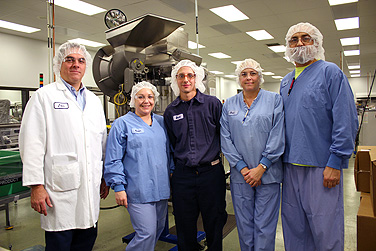News
TCIE helps Mentholatum boost business

John DeJac, Karen Ovitt, Dave Kiefer, Staci Farinacci and Goran Jekic of Mentholatum’s Liquid Line Team.
In 2009, the Mentholatum Company, faced challenges in meeting targeted production levels of its non-prescription pharmaceutical and health care products.
Officials at the Orchard Park headquarters of the global health-and-wellness company needed to improve the capacity and overall effectiveness of the business in a way that would support their strategic plan.
With the help of UB’s TCIE, which provides the business community access to the university’s engineering resources, Mentholatum’s leadership decided to give the “Lean” methodology a try: The continuous-improvement methodology maximizes customer value while minimizing waste.
Since implementing a Lean initiative with TCIE’s guidance, changes and improvements in business processes have produced the following advancements at Mentholatum:
- changeover time for a manufacturing process involving a tube filler was cut in half and its throughput increased by 100 percent, with no capital expenses involved
- production delays, travel distance and time, and direct labor costs decreased in the warehouse staging area
- an approval process that used to take months to complete now finishes within days or even hours
- lower inventory levels can be maintained with quicker changeover and greater performance reliability, resulting in lower costs
In addition, overall productivity has increased, including a jump of 30 percent for the lip balm filling manufacturing line alone.
Mentholatum leaders say TCIE’s training and expert assistance over the past two-and-a-half years is just the start of their “Lean journey,” which has had a positive impact on employee culture. Combined with the support of upper management, a culture of continuous improvement and Lean principles has emerged at Mentholatum.
“When they see things turn around, employees are re-energized and they’re connected,” says Harold Pearson, second-shift plant superintendent. “The teamwork is there and so is a sense of ownership.”
The pilot project, which sparked the company’s pursuit of continuous improvement, was an activity called Value Stream Mapping. The activity involved analyzing steps of the company’s process for approving new products, followed by project team members generating ideas for improvement.
Eight employees from different departments were chosen to be Mentholatum’s internal team of Lean practitioners. They completed training and undertook projects as part of TCIE’s Certified Lean Professional program. The process allowed the company to identify areas that could be streamlined, spawning a series of enhancements.
In 2010, the company brought in TCIE’s Executive-on-Loan program to focus on strategic initiatives. The TCIE Lean expert spends time on site every month integrating Lean tools to help management reach its goals, whether it is boosting operational efficiencies or reducing costs.
Kevin Aylsworth, director of engineering and maintenance at the company, notes that the executive-on-loan’s flexibility meets scheduling needs of a three-shift operation.
“Working with TCIE is very easy. It’s been a nice partnership. TCIE’s schedule is very accommodating,” he says. They’re here when we need them. They really have a boots-on-the-ground approach.”
The Executive-on-Loan program is available to companies for other improvement methodologies as well, including Six Sigma and ISO (International Organization for Standardization).
At Mentholatum, measures to assess performance are being refined and identified under the executive-on-loan’s guidance. It’s an important activity, according to Aylsworth, because “without metrics, you are not going to know what you have to do. We are using metrics to measure quantifiable progress and sustain our achievements.”
Dedicated work teams are now a staple for the production lines that represent the majority of Mentholatum’s business. The practice hinges on creating a core group of experts for a work line.
“It makes it a more efficient operation,” says John DeJac, production manager, noting that early skepticism among employees reversed once benefits started surfacing. “We have better troubleshooting with dedicated work teams.”
The Lean methodology is increasing communication with the implementation of regular team meetings. Thanks to the process called 5S that efficiently organizes work spaces, production tools are labeled and have their proper place, eliminating time once wasted searching for items.
“People are thinking about work with a Lean mentality,” Aylsworth says. “Planning involves elimination of waste and designing items with the end in sight.”

Reader Comments